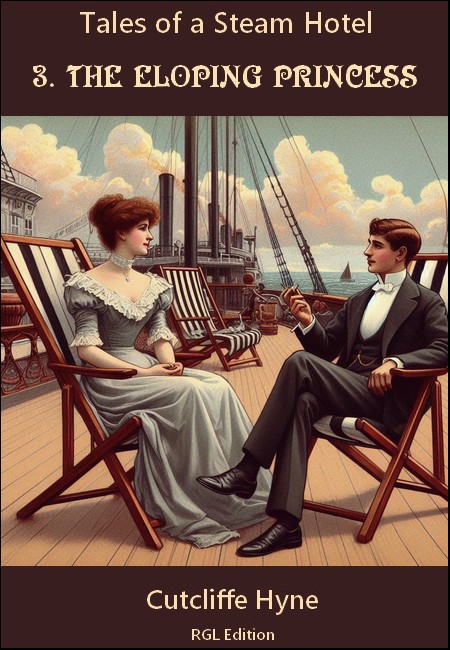
RGL e-Book Cover©
Roy Glashan's Library
Non sibi sed omnibus
Go to Home Page
This work is out of copyright in countries with a copyright
period of 70 years or less, after the year of the author's death.
If it is under copyright in your country of residence,
do not download or redistribute this file.
Original content added by RGL (e.g., introductions, notes,
RGL covers) is proprietary and protected by copyright.

RGL e-Book Cover©

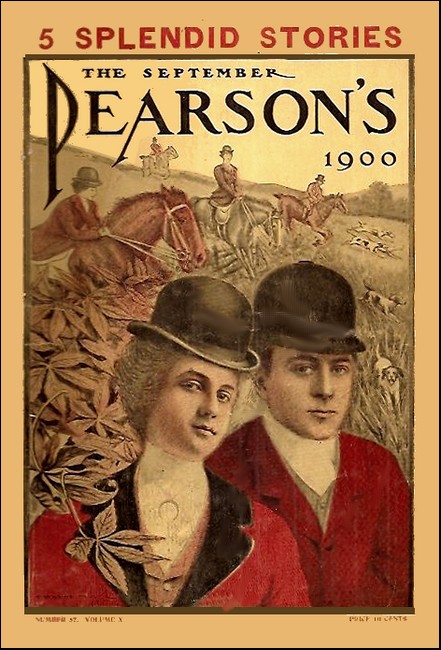
Pearson's, September 1900, with "The Eloping Princess"
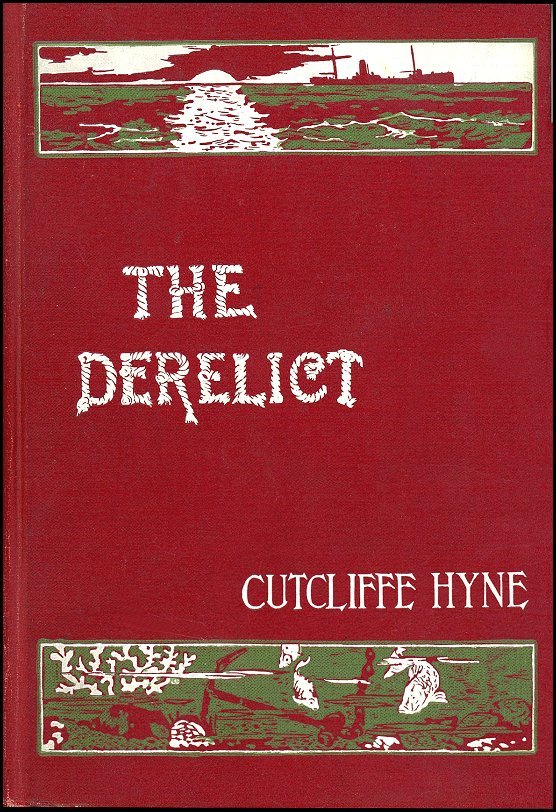
The Derelict, Lewis, Scribner & Co.,
New York & London, 1901, with "The Eloping Princess"

The Derelict, Lewis, Scribner & Co.,
New York & London, 1901, with "The Eloping Princess"
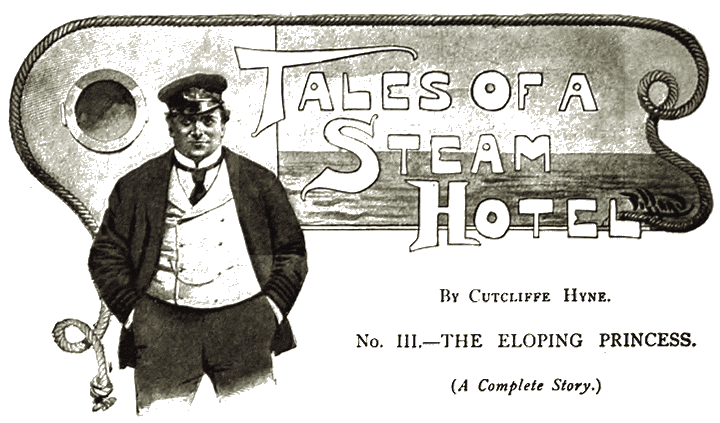
THE first thing Mr. Horrocks knew about it was from Draycott, the Ambleside's fourth officer, who told him he had seen two fellows plainly trying to hoist one of the passengers overboard.
"They'd have done it, too, Purser," said Draycott, "if I hadn't run out along the boat deck, and slipped over by a davit, and jabbed one of them on the head with the heel of my boot. They quit trying to murder the fellow then, and scooted, and by the time I'd swung myself down on to the promenade deck, they were away out of sight. Funny thing was, the fellow they'd been trying to put over the side scooted, too. He went down the first-class companion."
"Told the skipper?" asked Mr. Horrocks.
"He was on the bridge at the time and saw about as much as I did. He didn't seem to think considerable of it. I fancy that taking the old packet along through this fog gives him all the headwork he's any use for. He was there on the bridge when I came on watch, and he was there when I was relieved. They're pretty bad for all of us, these fogs, but they're killing for a skipper. Well, I've given you the news, and now I'll be off to the mess-room and get a mouthful of grub, and then turn in."
"Wait a bit, my young friend. You've either told me too much or too little. I'm nursery maid to the passengers on this boat, and if they smash one another about I'm the man that gets blamed. What were your friends like?"
"Too dark to make sure of any of them. But the two who were trying to put the other fellow over the side had black clothes, I think, and they ran away towards the second-class; and the victim, if that's what he was, had a beard. Bit odd, wasn't it, that he didn't choose to stop to explain what their little game was with him? Oh, yes, and there's one more thing, they were cursing one another in French—or it might be German."
"Sure it wasn't Spanish?"
"Of course it might have been. But anyway it wasn't English!"
"Great Washington! What a thing it is to be a linguist."
"Steady on, Purser. Don't get stuffy. I'm paid to help to navigate this packet, not to act as assistant major domo."
"You're paid to do your duty by the Town Steamship Line," said the stout Purser sharply, "and the older you get, the more you will find what that includes."—Draycott had just come from command of a barque, and of course, starting on steam for the first time, he found it a trifle hard to begin at the bottom over again, and to do as he was told. But then all the Town Line's junior officers hold master's certificates, and the Purser was used to a bit of uppishness in them from time to time when they first joined—"You were quite right to report this to me. We can't have these Donnybrook games going on amongst the passengers; they injure the boat's reputation. The three passengers you saw must be found, and warned, and watched, and if necessary put under restraint. The responsibility of finding them rests upon you."
"I can't do impossibilities."
"You'd get on a heap better in this Company if you could. Let me tell you it's the officers who show brains who get promoted here. Those that can just stand and watch and eat their biscuit aren't specially wanted. Here, have a cigar. And just keep a bright look-out to-morrow for your friends of the scrimmage. If you like, come down into saloons with messages for someone during meal-times. Do it how you like, only anyway do it."
"Right-ho," said the fourth officer, and took himself off.
Now so far, the matter did not worry Mr. Horrocks much. Captain Clayton had evidently thought very little of it, and he was quite as keen to keep the passengers orderly as the Purser was; and what Mr. Horrocks had said to Draycott was more to impress that young man with a proper sense of his responsibilities than for any other reason. The officers which the big Atlantic passenger lines take from tramps, and freighter lines, and sail, need a good deal of breaking in that way before they are any real use to that higher branch of the mercantile marine.
But the next morning there was a row on deck which brought this other scuffle pretty sharply back to the Purser's memory. The deck steward called him out of the smoking-room with a could-he-speak-to-him-a-minute, and a look on his face that meant business.
When Mr. Horrocks' portly form was outside in the fog, "you'd better be sharp, sir," said the man. "There's a pair of them quarrelling away aft there, and they mean ugly business. They won't take any notice of me. One's a foreign gentleman with a beard who came on board with two ladies, and the other's a younger gentleman, clean-shaved, that I rather fancy is American. It seems they fell out about a deck-chair that—""
However the Purser had not time to hear details. They came up in sight of the scuffle, and Mr. Horrocks saw a nickel-plated revolver that the foreign gentleman had produced from somewhere, tweaked suddenly out of his fingers and sent flying overboard, where it vanished like a conjurer's trick in the fog, and then his collar was taken in a good firm grip, and a sharp-toed American boot was several times kicked hard into his foreign tail. As this latter proceeding, in view of the revolver, seemed to carry some elementary justice with it, the Purser slowed his pace, so as not to unduly cut short the dose. After that, of course, he had to assume the dictator over them with due dignity and weight.
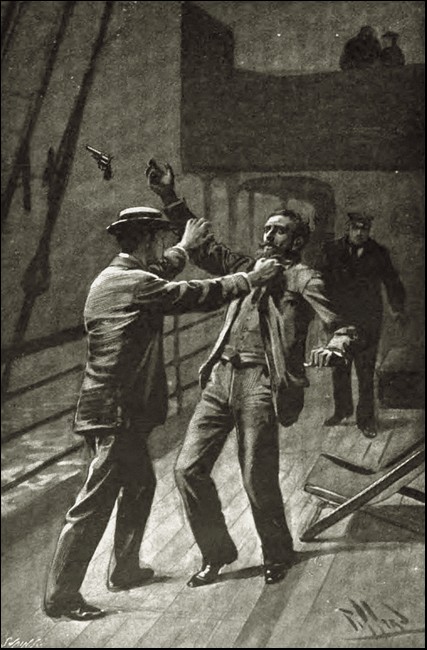
A nickel-plated revolver was sent flying overboard.
They took his lecture like a couple of schoolboys caught stealing apples. "As for you, sir," he said to the man with the beard, "I don't know what may be the custom in your own country, but let me tell you that here on this boat I could put you in irons for attempted murder, on the evidence of my own eyes alone, and hand you over to the police ashore. And as for you, Mr. Austen, I don't think much of Harvard if they teach you there to brawl with foreigners in a public place like this."
No answer from either of them.
"And look here, sir," he said to the man with the beard, "it's beginning to come to my mind that this isn't the first disturbance you've made on board here. What about last night?"
This was a sheer outside shot of Mr. Horrocks. Draycott had only told him about a "man with a beard" whom he seemed to think vaguely was a "foreigner." But it seems he hit the mark. The culprit started as if someone had stuck a pin into him.
"But that was different," he stammered. "This is different."
"I forget you name, sir?"
"Merliner."
"Then, Mr. Merliner, let me tell you that you are a very quarrelsome fellow, and understand, once and for all, that this brawling is not to occur again. If it does, whatever is the excuse, you travel the rest of the way to New York in irons. I will not have the rest of the passengers scandalized and made uncomfortable by this sort of behaviour."
Mr. Merliner clicked his heels together, bowed, and took himself off, and the Purser turned to give Austen the balance of his dressing. "And I should like to know, Mr. Austen, if you were one of the rowdies who were reported to me as trying to murder that gentleman last night."
"No, I was not."
"Well, anyhow, you are tarred with the same brush. You are brawling here now, and if that's Harvard manners let me tell you—"
Austen got red. "Look here, Purser, I've taken my dose quietly, but any further hectoring I've got no use for. And let Harvard alone. That man's a quarrelsome brute —deliberately quarrelsome. Why, by your own showing, he is. You say you caught him kicking up a row last night. Well, there you are. And let me tell you this; anything he's got from me he jolly well deserves."
"Well, we'll take it so. But you must give me your word this does not occur again."
"I shall give you nothing of the sort."
"Very well then, you force me to report the matter to the Captain. I can tell you offhand what his decision will be. If it's foggy weather, he's on the bridge night and day, and he's got no time to worry with troublesome passengers. He'll say: 'Lock the fellow into his room till we've tied up at New York!'"
"My father would raise a pretty wasp's nest round somebody's ears if his son came home to him that way without adequate cause. Now look here, Purser, don't be absurd. If you want to lock up anybody, put the chain on Merliner. That man's dangerous, and it's my private opinion he's mad."
"What did you quarrel with him about?"
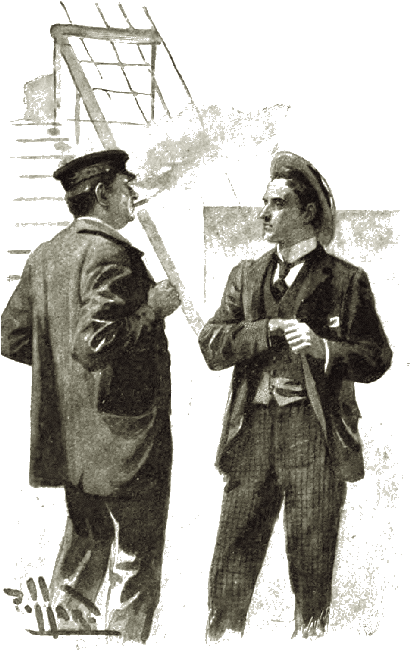
"What did you quarrel with him about?"
"I didn't quarrel. It was he who made himself absurd."
"It takes two to build a quarrel."
"Here's the tale then. I was sitting on deck smoking, and looking into the fog, and thinking. Then who should come along but the very girl—I mean a lady that I'd noticed at one of the tables in the saloon came along, and there was a good roll on as you see, and she was evidently hard put to it to keep her footing. She seemed to be looking for a chair, and, as there wasn't another one about, I offered her mine. Couldn't do less."
"Of course not, if she happened to be the very girl you were thinking about as you looked into the fog. So she took the chair?"
"Well, yes. But she said she didn't want to rob me, so we compromised matters by my sitting down on the deck beside her. Of course, on shipboard one isn't very formal about introductions and that sort of thing. She's a Miss Schmidt, and she comes from Vienna."
"You seem to have been making good use of your time."
"I tried to," said the young fellow simply. "I've never come across a girl I admired more. But that's my own private affair, and I don't want to bother you with it. Here's what caused the row: We'd been chatting for half-an-hour, when that infernal siren wasn't boo-hooing above us, when up came that fellow, Merliner, from somewhere out of the fog, and promptly proceeded to make an ass of himself. Of course, I couldn't do anything before Miss Schmidt. He seemed to know her pretty intimately, called her by her Christian name, in fact; and away she went down below, either to get out of the way of his tongue, or to save a further scene. I thought it was very sensible of her. And when she was gone Merliner clicked his heels and bowed and grinned, and was going to take himself off, too. Naturally I stopped him."
"And began the quarrel."
"Hadn't he begun it already? You don't suppose I was going to sit tight after being insulted in front of a lady? We weren't taught that at Harvard anyway. Purser. He'd the nerve to say he forbid me—he, I'll trouble you, forbid me to speak to Miss Schmidt again. On which I told him that America was a free country, and the high seas belonged to Americans as much as to anybody else, and I shouldn't quit speaking to the lady unless I saw her own particular wishes ran that way. Why then he made a great fuss and pulled out a gun, and after that of course I couldn't do less in reason than take the gun away from him, and just teach him it was an argument he shouldn't have brought forward. See?"
"Mr. Austen," said the Purser, "you've been ill-treated by birth. You shouldn't have been born the son of a railway millionaire. You ought to have been a newspaper man. You've a grand knack of reporting a scuffle."
Austen laughed. "Well, Purser, I was real mad with the fellow, and when he did give me a chance of kicking him, I guess I kicked hard. Say, what's he to Miss Schmidt? I've a reason for asking."
"Well, what's your reason?" queried the Purser. He could guess that without being told, but he liked to see the lad blush when he mentioned her. Austen got very nicely red, and laughed.
"Never you mind. Be a good boy, now, and just tell me all I want to know."
"Can't. We print the passengers' names down on our lists, but not their pedigrees."
"Oh, I know the passenger list says—Merliner, Mrs. Muller, Miss Schmidt. Merliner sits next to her at table, and there's a vacant place on her other side presumably for Mrs. Muller. I say, Purser, couldn't you give me that vacant place?"
"Certainly not. That's Mrs. Muller's place when she's through her seasickness."
Austen shoved his fingers into a waistcoat pocket and blushed redder still. "Say, I wouldn't mind making it worth anyone's while—""
Mr. Horrocks pulled him up before he plunged too far. "Mr. Austen," he said majestically, "remember you're not speaking to a steward," and there he left him.
The dignity of a Purser is not always sufficiently obvious to the lay mind, and as a consequence it is a property which is guarded with nice care. Passengers might be in Mr. Horrocks' society for a whole voyage, and think him the most free and easy creature imaginable. But once let them overstep the bounds, and he would chill into very icicle of pride. No man liked a valuable present better than Mr. Eli Horrocks. But it had to be given him in the proper way.
Now steamer flirtations are no very new thing to a Purser, who sees on the average eight every voyage; and most of them he does not interfere with. They please both sides when they are at sea, and once ashore they are usually forgotten. But it seemed to Mr. Horrocks that this particular entanglement was one which would bear watching. As he put it to me afterwards: "Old-man Austen, the Railway King, was a party who put a lot of business in the way of our Firm, and if Boy Austen, who was all the son he'd got, contrived to get badly mussed up with an undesirable woman whilst he was on the Ambleside, Old-man Austen was just the sort to take it out of the Line by way of revenge. You see when a strong man of his type gets mad, he must hit somebody before his temper simmers down, and naturally he likes to do his hitting on something where he won't be sorry for afterwards."
So a good deal seemed to depend on who this Miss Schmidt might be. All the Purser knew then was her name, that she was chaperoned by a Mrs. Muller who had been persistently seasick, and whom he had not seen, and that the man Merliner, who appeared to be a shady customer, had some sort of hold or proprietorship over her. They see funny things on the Atlantic ferry which rich young men get mixed up in, and Mr. Horrocks would not have been a bit surprised to find out that Miss Schmidt was an actress—he detested actresses—or somebody no better than she might have been, and that the whole gang of them were artistically laying for Boy Austen, with a view to harrying Old-man Austen's check book. As I say the thing is done regularly.
By good luck he happened to come across the young lady just after lunch sitting in the head of the companion, and had a spell of talk with her. She was a trifle cold, and inclined to be distant, and did not seem over and above pleased with Mr. Horrocks' offer of conversation; but he had not been a Purser all those years without finding out the knack of making a passenger talk to him civilly, whether he or she liked it or the reverse, that is if talking suited his book.
I must say, though, with this one he could not quite make her out. If there is anything at all wrong or shady with them, they are only too pleased to propitiate the Purser, but Miss Schmidt had got the art of making him see she regarded him as a ship's official and nothing beyond. She spoke quiet, cultivated English, with just the least flavour of some sort of accent, and if she was not a genuine lady, the Purser considered that she acted the part very well. He saw all grades of femininity, and considered himself a bit of a judge.
In his own words: "She wasn't what you'd call pretty, but she'd a pleasant enough face, and one that I should call strong, but I still couldn't be sure, of course, that she wasn't on for blackmailing. In short, I'm free to own she rather puzzled me, and I made up my mind I'd apply for the further information I needed from Merliner. If Merliner refused to tell me what I wanted, I knew how to put the screw upon him."
However, as it turned out, the Purser got his next news of the matter from quite a different source. They had on board an American bishop, who was returning home after doing a tour in Palestine at the expense of his congregation. According to Mr. Horrocks' view, "He hadn't the class of an English bishop, as was only natural from a man who knew he could get the sack any moment he didn't please his flock, but he was a fellow of some head, and he was about as anxious to make himself known and popular as any creature I ever came across."
"Oh, Purser," said he, "can I see the Captain?"
'Well, I shouldn't recommend it," said Mr. Horrocks, "unless it's something mighty important. Captain Clayton's been kept on the bridge by this fog ever since we left Queenstown two days ago, and when a man's been held awake for all that time, he usually doesn't care to be bothered unless it's for something pretty big."
"What I want to consult him about, is a point in nautical law. But perhaps you can quote me a leading case. Are weddings at sea legal and binding when performed by a properly ordained clergy-man like myself?"
"Depends entirely upon circumstances."
"Did you ever come across one before in your own experience?"
"H'm. Can't say I ever did. But I've heard of them."
"'Authorities,'" quoted the Bishop, "'doubtful.'" He frowned and looked annoyed. "I may mention that this is an exceptional case."
"It would be. In an ordinary way people would have many objections to being married at sea. But if you'd give me a few more details, I can probably offer you a more definite opinion."
"The question is how much can I tell? The information I am acting upon was delivered, as Rome would say, 'under the seal of the confessional.' But in confidence —am in speaking of confidence?"
"Certainly."
"In confidence I may tell you that a Mr. Merliner is the prospective bridegroom, and he has quite satisfied me as to the urgency of his reasons for marriage."
"That's sufficiently vague. May I hear the lady's name?"
"Miss Schmidt."
The Purser felt a small glow of pleasure. Here was a very simple way of insuring that Old-man Austen did not get angry, and fall foul of the line, and if Boy Austen was not pleased—well, that would not affect Mr. Horrocks much. He would probably be grateful enough over the escape in six months' time. However, the Purser had his natural curiosity still, and did not yield to the Bishop at once.
"You'd much better give me the whole tale, and then I can tell you more decisively what is best to do. Is the lady a ward in Chancery that Merliner's running off with, and he is frightened at being arrested at the other side?"
The Bishop laughed rather nervously. "No, she isn't a ward in Chancery, and I don't think Mr. Merliner fears anything the police can do to him in the States. I'm afraid you must be satisfied with this, Purser; the danger he dreads is on board here, and it's no less than assassination. He says there have been about six attempts to get rid of him already."
"Ah! And, come to think of it, I've seen something of this myself. Well it's got to be stopped, and quick. I can tell you we don't allow that sort of continental game on the Town Company's boats. If Mr. Merliner isn't safe at large, I'll have him put somewhere under lock and key where he can't be got at. We don't allow Anarchists of his description to bring their quarrels here for settlement."
"Tut, tut," said the Bishop. "The man isn't an Anarchist. In fact, you may take it from me he's someone very different. He's very highly placed indeed."
"I don't care if he was a shoemaker. He's got no right to be murdered, or to anyway dabble in murder on this boat. And look here. Bishop, as you've undertaken to act in some degree as his sponsor, I may tell you I'll have him put somewhere out of harm's way right now unless further explanations are forthcoming."
Well, there was the Bishop, a man who wanted to please everybody and do well for himself, fairly cornered. "My hands are tied, Purser. I much regret giving Mr. Merliner my promise of secrecy, seeing how you take what I have told you already. But there it is, and a promise has to be observed. I will go and see him again and make fresh representations, and get him to release me. He must release me."
"I'll lock him up if he doesn't," said the Purser shortly, "to keep him out of harm's way."
They had this talk in Mr. Horrocks' room, as the Bishop said when he first tackled him on the subject that he did not want to be overheard. No sooner had he gone, and the Purser had settled down to some ship's accounts, than there came another knock at the door, and he had to say "Come in" again. It was only a second-class passenger, so Mr. Horrocks said "Yes?" to him pretty sharply.
He was a seedy-looking individual —some sort of a German, the Purser guessed—but when he spoke, his voice was a gentleman's. He stepped inside without being invited, and shut the door behind him.
"That short, stout clergyman who was in here just now was talking to you about Herr Merliner?"
"Ah?" said the Purser, "was he? May I ask what the devil my private conversation has got to do with you?"
"Oh, it was easy to guess what it was about, and we are interested in Merliner. We do not intend to let him marry that lady, and if there are no other means of separating him from her, we shall use violent ones."
"The deuce you will! May I ask if you were one of the two rowdies who tried to put him overboard the other night?"
"Which time was that?"
"The fourth officer smacked one of you on the head with the heel of his boot."
"No, I did not touch him that time. I merely directed. Look," he said, and pulled up a coat sleeve, and showed the Purser a forearm in bandages. "He split that up for me. He wears a chain shirt himself, and that saved him several times."
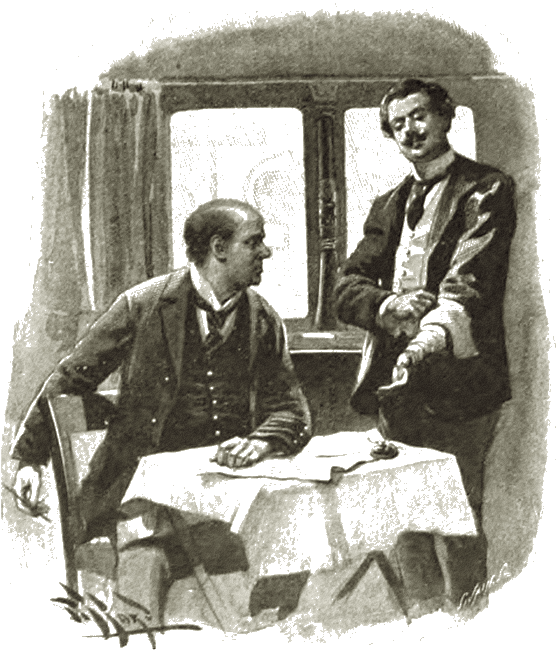
"Look," he said, and pulled up a coat sleeve.
"Well, you're a cheerful crowd, anyway. But why come to me? Can't you see that after what you've said, the least I can do is to ring for the master-at-arms and have you locked up out of harm's way for the rest of the trip?"
"Oh, I've reckoned on your doing that. But I've got five friends on board, who can do the work quite as well without me now that I'm wounded. What I came for was to see if you wouldn't help us, and so avoid unpleasantness. I know you pursers do not like to have fusses on your boats, and we on our side are equally anxious to avoid publicity. May I sit down?"
"No. Please remain standing. I do not choose to put criminals at their ease in this room."
"What! Have you no more idea than that about the matter yet? Why, sir, it's political, not criminal at all."
"I suppose you're a pack of beastly Anarchists, and you're pleased to call your murdering little ways political eccentricity." Mr. Horrocks put a fat finger on the bell. "More decent people have different ideas. I shall hand you over to the master-at-arms."
"You had better hear the whole truth of the matter first. You need not fear that I shall trespass on your hospitality by sitting down."
The man came out with his yarn then, and though queer things come to a Purser's ears pretty frequently on the Atlantic ferry, Mr. Horrocks never heard anything much more unexpected. Miss Schmidt was not Schmidt at all, but an Austrian Princess, an only child and an heiress to one of the biggest houses in that Empire. She was a cousin of the Emperor, and Mr. Horrocks, who was new to Court etiquette, was given to understand that the Emperor arranges all the marriages of this class of his subjects just as he himself sees best, and without in any way consulting their wishes or inclinations. This girl was ordered to marry a certain Archduke Fritz, and objected. The man hinted that her objections had been discourteously violent.
"By the way, isn't your Archduke Fritz an idiot, or hasn't he got a hump?" asked the Purser.
"I don't know. But he's an Archduke, and a good match. And, besides, the Emperor ordered it."
"Well, there is something wrong with him I know, but I forget exactly what it is. I saw all about it in a magazine article. Go on, Mr.—er, I forget your name."
"I am down on your passenger list as Mr. C. E. Meyer. So pressure was brought to bear on her—"
"What kind of pressure? Thumbscrews, or red-hot pincers?"
"Pressure. I know no details. But the Emperor is accustomed to having his own way in these matters, and always gets it sooner or later. Her Highness is a young lady of strong ideas, and refused to submit. With an older lady to act as chaperone, the Countess of-well, she is Mrs. Muller here—she managed to get across the frontier, and thought she would be able to do as she liked about Europe. She soon found the Emperor's messengers were close after her, and how she managed to keep out of their hands and avoid being taken back is marvellous."
"How do you work it in your pleasant country? Drug them, and stick a sack over their heads?"
"I know no details. I only know what I have told you, and that afterwards, when she began to get frightened, and went to England, she was very nearly caught and carried away from there also. I know that, because the affair had by then been placed in my hands."
"Nice chivalrous person you must be, Mr. C. E. Meyer. Don't you sometimes kick yourself for taking up this kind of occupation?"
"The orders came from the Emperor, and so I obey them. If the lady thinks she has cause to complain, she must remember that her own disobedience started the trouble in the first instance. At present she has an idea that if she marries this Baron Merliner, whom apparently she has a liking for, our pursuit will cease. I am bound to say the move will have points in her favour. Of course such a marriage would be morganatic and illegal, and whether or not the Emperor will still wish Her Highness brought back to marry the Archduke Fritz, I do not know. I should have to await instructions before acting further. But anyway my present obvious duty is to prevent this marriage."
"Oh, is it?" said the Purser. "And do you think you are boss on this ship?"
The man shrugged his shoulders. "I have five subordinates, who are entirely devoted to their orders. Merliner will be shot as he sits at dinner if there is no other way out of it. They will draw lots as to who is to shoot him. One man will do the business and blow his own brains out afterwards, and the others will receive promotion. It will be an exhibition (shall we say) of discipline, loyalty, and subsequent reward."
The Purser shoved his finger home on the bell push. "Forewarned is forelegged, and I'll put my right foot forward at once. You shall be in irons, Mr. C.E. Meyer, and in a safe place very much out of the way before two minutes are over."
The fellow flushed. "I beg your pardon, Purser, but is it necessary? I am an officer and (so my folks told me) a gentleman. I may have a code different to yours in some matters, but, at any rate, I am a man of honour. I offer you my parole."
"Perhaps you had better define the exact scope of it."
"I interfere in this matter neither by word, deed, nor look till I am clear of this ship."
"That seems comprehensive enough. You promise that?"
"I give you my word of honour."
"Very well, I take it." A steward came in in answer to the bell. "Oh, steward, bring in a small bottle of Pommery '87."
Mr. Horrocks judged that his visitor would know good wine, although he was masquerading in the second-class, and followed an occupation which was, to say the least of it, questionable. Besides the man was undoubtedly in touch with the high ones of this earth, and some day might be able to do Mr. Horrocks a good turn. You never know your luck about these matters.
"Here's to the Princess," he said, when the champagne came and was poured out, "and may she have all her own way."
"Here's to Her Highness," said Meyer, and they finished the half bottle very pleasantly between them.
"Now Mr. C. E. Meyer," said the Purser, "if you'll kindly go and imbibe the fog on deck, I shall be obliged to you."
"I'm entirely at your orders," said he, and took himself off, and Mr. Horrocks found the Bishop and told him that he had procured all the explanation he needed. The affair should have the Purser's professional benediction, but the Bishop must marry his man before the next meal.
"But you're sure it'll be legal?"
"Legal, my dear sir, it will be legal fast enough if you are a bona fide Bishop. The only thing I was hesitating about before was, would it be desirable? But I am quite satisfied on that point now. If Merliner isn't married out of their reach, his friends the enemy will shoot him dead at the luncheon table. They're the kind of fanatics that quite mean business. You may use my room for your cathedral, and now please go and fetch the lady, and I'll round up Merliner. The sooner we get this business off our chests, the sooner I shall feel easy."
Mr. Horrocks fetched Baron Merliner to his room, rang for the steward to take away the empty bottle and glasses and bring another magnum of the same, and then felt that his preparations for the wedding were complete.
He experienced no inclination to talk with the prospective bridegroom, but fell to conning over in his mind how he would dish up the story for the newspaper men in New York. These were gentlemen who always waited upon him on arrival to be told anything of interest which had occurred on board during the passage, and it was seldom that they were allowed to get hold of unvarnished truths, for fear lest they would damage the credit of the Line. In fact, these gentlemen of the press were the bane of Mr. Horrocks' life, and he would have cheerfully witnessed the whole newspaper world of New York and Liverpool put to death by torture.
But it was essential that he should keep on good terms with them, and there were times when they had distinct uses. For instance, this present excitement might be worked out into a really good advertisement for the Line if the press was properly handled. And it was part of Mr. Horrocks' professional equipment to possess the skill and diplomacy necessary to manage these things.
Meanwhile the time kept moving on. Mr. Merliner fidgeted and brushed at his moustache till it bristled like a cat's, and presently Mr. Horrocks began to grow impatient also. A Purser on board a boat like the Ambleside values his time and importance far too highly to wait very long on the pleasure of a mere Bishop who runs up no wine bills. And besides, he had as yet found no leisure to look in at the smoke-room during the whole of that morning. Indeed, be was on the point of going to hurry him up when in the Bishop came, looking dejected and annoyed.
"Well," said Mr. Horrocks, "something else wrong now?"
"It's the lady. I approached her on the subject. She refuses to entertain it."
"Great Washington! Is this a harlequinade I've been dragged into?"
"I have done my best," said the Bishop, bristling up, "and I may say I am as much annoyed as yourself. I went out on deck, and found her there wrapped up in a chair, and talking to Mr. Austen. They seemed intimate, and when I asked if I might have a few moments' private conversation with her, she showed annoyance. However, Mr. Austen had the politeness to leave us. He comes from the States, and knows what is due to my position. His father—"
"Yes, yes. And so she would not come. Please get to the point, sir."
The Bishop glared at Mr. Horrocks, who imagined that he used the ecclesiastical equivalent of a silent swear.
"I consider I am being very badly treated over this matter on all sides. I approached the lady with pleasantries at first, and she snapped back replies straight from the ice chest. She seemed to resent my being brought into the matter at all. I pointed out to her how affairs had developed, and laid especial stress on the danger to the Baron's life which her—er—refusal to play the desired part would entail. She mentioned her idea that it would have been more chivalrous of him to have taken his risks in silence."
Merliner wanted to give out his views of the matter here, but Mr. Horrocks stopped him sharply.
"Look," he said, "you either wait till you're given leave to speak, or get outside this room. Your reverence has the platform still."
"I did my best to persuade her, but it was no use. The original idea of marrying the Baron here was, so she said, for her own protection, not for his; but thanks to this new light which I had thrown on the matter, she saw she was making a mistake, and would cease to look to him for protection. 'And that, sir,' she said, 'solves, I think, the point you raised about danger to Baron Merliner's life. If I refuse to marry him, none of these assassins on board here will wish to do him harm.'
"'You put me in a very awkward position,' I said.
"'I believe you came into the matter, sir, without my invitation,' was her answer, and then she formally bowed the interview to an end.
"Very good," said the Purser, "then we'll consider the whole of this foolishness over and forgotten. You're with me there, Bishop?"
"Certainly, there's no good advertisement in it for me."
"The consequences appear to fall on my shoulders," said Merliner.
"Then tell your friends, the enemy, your wedding's off."
"They wouldn't believe me. However, I do not care. Under the circumstances the excitement will be stimulating."
"No, you don't," said the Purser. "We're going to have no more excitement of that kind on this boat, so you may go and take off your chain shirt, and simmer down into a peaceful citizen. I'll go and tell the man who calls himself C. E. Meyer to switch off his cut-throats."
The Purser went out on deck then and found Meyer. At first he was inclined to be awkward. "You must make your own dispositions, Mr. Horrocks. I gave you my parole that I would not interfere with the matter you speak of neither in word, deed, nor look till I am clear of the Ambleside, and I find the state of rest sufficiently agreeable, although I must say the food you give us down there in the second saloon is very inferior. Now on the German boats they feed one very differently."
"I wish to Heaven you'd crossed by one. But let me tell you they feed one a precious sight worse in the New York Penitentiary, and that's where you'll be studying the menu next if you worry me any more here."
Meyer looked annoyed. "But I took it for granted that there was a truce between us?"
"So there is, till we touch our wharf. But once there, I can remember or not to give you up for attempted murder, as I choose. Whether you are convicted or not is another matter. But I bet you have a sweet time in the police cells waiting trial."
The Austrian drew an imaginary sword and offered the Purser the hilt. "Mr. Horrocks, I surrender. You are invincible, and, it is only the thought of a good meal ashore which makes the idea of your dinner in the second class saloon here tonight at all endurable. Merliner's well-being shall have my best attention."
"Thanks. That's quite sensible of you. I'll tell him to drop that absurd mail shirt overboard."
"On the whole I should advise him, if I were you, to place it at Her Highness's disposal to lend to his possible successor. Purser, I have the honour to wish you good morning."
"Now what," thought Mr. Horrocks to himself, "did he mean by that?" And presently, walking forward along the deck to dice someone for cigars or cocktails in the smoke-room, he was able to read the answer with his own eyes. Boy Austen's deckchair was drawn up alongside this dangerous lady, and if ever Mr. Horrocks saw a couple that had fallen thoroughly in love with one another, there they sat.
Now did Mr. C. E. Meyer mean to imply that his merry men had got their eye on Boy Austen, and were prepared to murder him if necessary? It was beginning to look very much like it.
The flirtation between the pair was too obvious to be missed. The men were grinning over it in the smoke-room.
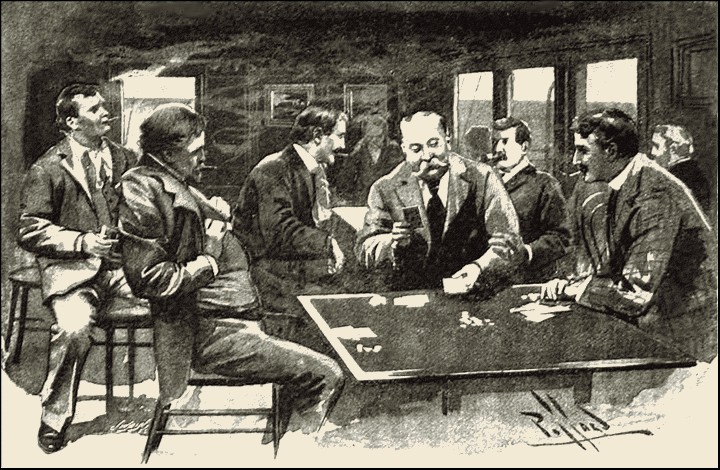
The men were grinning over the flirtation in the smoke-room.
"Boy Austen's hooked for sure this trip," said one. "I wonder how Poppa'll take to his only daughter-in-law?"
"Bad deal for Boy Austen if the old man isn't pleased," said another. "He'll be cut out of the will, and'll have to fire an engine on one of Poppa's roads for a living."
"Old-man Austen married when he was young," said another, "and took what he could get. But he's got a notion the Heir of the Austens should marry about the highest grade article there is on the market."
Then someone caught sight of Mr. Horrocks.
"Here's the master of the ceremonies. He's responsible for all social events on this ferry boat. What's wrong with asking the Purser for the latest betting on the result?"
"Better apply to Captain Clayton," said that portly person. "He's the expert on board here who can see furthest through a fog."
"No flies on the Purser," said someone else, and then a table of them set to amusing themselves with the dice-box for drinks and cigars till lunch time.
The Purser saw Boy Austen in the course of that afternoon, and managed to get him alone. "Look here," he said, "I wish you'd take a hint from me. You'll find it a lot healthier if you left Miss Schmidt alone till we get to New York. After you've quitted the boat, of course, you can do as you please."
"Now, what the devil do you mean by that, Purser?"
"Neither more nor less than what I've said."
Boy Austen looked at Mr. Horrocks rather queerly. "I've had a couple of anonymous letters giving me the same advice."
"Quite likely. There seem to be a whole regiment of ragamuffins on board here watchdogging her."
"Of course I chucked the letter over the side."
"You would do. Told the lady?"
"No."
"Well, be wise, and let her alone till you meet ashore."
"I tell you flatly I shall do no such thing." He got very red. "I want to see as much of her as I can. Always."
"Do you know who she is?"
"Miss Schmidt."
"No such person," said Mr. Horrocks, and told him her exact titles and position, and concluded that that would choke him off.
He seemed to guess the Purser's scheme. "Well," he said thoughtfully, "I guess there's enough of the American about me not to let that make any difference. I've not noticed that the ladies in my country are adverse to marrying titles, and I don't see what's wrong with some of the men following their example. Anyway, I'm a better bargain than Archduke Fritz, except, perhaps, for his accumulation of grandfathers, and as for Merliner, well I call him small beans, anyway."
Mr. Horrocks laughed. "You've got a pretty cool and commercial way of totting up the chances."
"And why shouldn't I have? Great Jones! Purser, isn't marriage a thing that should last a whole lifetime? First you get very fond of a girl, and then you proceed to reckon her up and see if she's adapted to the position. It's the men that don't fulfil both those requirements that bring fees to the divorce court."
"He knew what he wanted, did Boy Austen," so the Purser told me afterwards; "and I'd a notion he knew also what Old-man Austen would like, and he set about getting it without any extra delay. He went straight away from me and proposed marriage to the Princess there and then. He mentioned he'd found out exactly who she was, and how she was circumstanced, and I suppose he brought forward the other items in his own way; as I have said before, it was plain to the naked eye that they were as fond of one another as a couple could be; and as a result she accepted him as her future husband, and promptly began to have horrid fears for his safety."
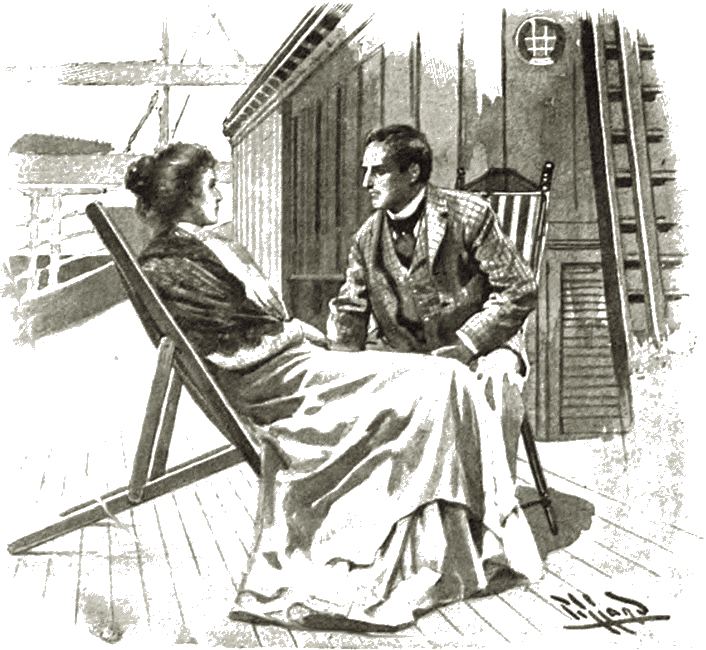
He proposed marriage to the Princess there and then.
Boy Austen, as was perhaps natural, had a profound contempt for the idea that any mere foreigner on a British passenger steamboat would dare to assault a free American citizen, and "only hoped they'd dare to try it." He had learned the noble art of self-defence, and would enjoy heartily the chance of pounding anyone who annoyed either himself or his ladylove. "To get hitched up on board would be a mere confession of funk." They would be married with due form and ceremony ashore, and if the lady was keen on the Bishop, he might tie the knot for them.
He told Mr. Horrocks all this himself, and that worthy man got very scared about him and had him looked after a lot more narrowly than Boy Austen guessed about. The Purser was profoundly impressed with the business-like intentions of the enemy, and was sure that they would be after Boy Austen as enthusiastically as they had been after Baron Merliner. Merliner the Purser did not want murdered on board for the credit of the boat; but if they shot Boy Austen, Mr. Horrocks felt that he would have Old-man Austen to reckon with as well. He put this to Boy Austen, but that young man would not listen to reason. Boy Austen said that if he was willing to take his risks, the Purser might surely take his. In fact, he was a bit above himself. Young men often are during the early days of their first engagement.
But if Boy Austen would not take danger seriously, the Princess judged her fellow countrymen better, and she it was who put on the screw. She was a young woman who had got a good deal of her own way, and, if one might judge, intended to have more of it. Her ultimatum was that unless she was married there and then on the ship the engagement would be broken off. So, naturally, on that the bridegroom gave in.
Mr. Horrocks' room was used after all, and, failing anyone else, he was best man. Mrs. Muller, or whatever her name was, a fluttering old lady who was still very qualmy, sat on the settee and gave the bride away, and the Bishop went through the service with unction and skill. The Purser wanted Captain Clayton to come down and lend it his official countenance, but the fog was still very bad, and Clayton said he could not leave the bridge. He said he would enter the event in the log, when the Purser asked for that. But it was Mr. Horrocks' private belief he wanted to be clear of the business if anything went wrong. Captain Clayton made it a habit to be very careful about the feelings of millionaires and people with titles. So Mr. Horrocks felt that if anything went wrong it would be "Blame the Purser."
He fetched out the magnum after the event, and, with the exception of the Bishop, who was a teetotaller, they all did well at it, and felt cheered, and Boy Austen gave his views on Emperors who tried to dragoon their female subjects into distasteful marriages. "However, they'll not play any more kidnapping games now," said he, confidently enough. "I quite agree she's worth pulling down the whole of the United States to get, but there's no European nation will try that. We should make war quicker'n you can think on any country that tried to steal one of our citizens that way."
They both seemed very pleased with what they had done, and went out into the fog for their honeymoon, and the Bishop escorted Mrs. Muller back to the couch in her own room, poor old lady.
Mr. Horrocks found Meyer then and told him what had taken place. Meyer showed a great deal of annoyance, but he took the sensible part. "I tell you frankly," said he, "that after we'd done with Merliner, I thought the coast was clear. I'd no idea she'd marry the other fellow in such indecent haste. Of course anyone of Royal blood can't marry a commoner legally. It's only a morganatic union."
"I bet American courts won't take that view," said the Purser cheerfully.
"Time will show. Time will show, too, whether my Emperor still wants her back. But in the meantime our hands are tied, and must remain so till we get ashore, and wire for further instructions."
"That's all right," said Mr. Horrocks. "Come and have a glass of fizz. Once off this ship, I don't care, though personally, I should say you will find that the pair of them, with the American nation at their back, will be a bit above your weight to handle."
One way and another Mr. Horrocks had got a story which would suit the newspapers down to the ground, and he spent a good many hours knocking it into shape that would do best credit to the Line and bring the boat a sound advertisement. He typed out his fair copy nicely, and manifolded it so that each of the reporters could have it as a groundwork; and when the boat got in and the newspaper men clustered round him, they took the sheets from him with howls of delight. Mr. Horrocks had a fine journalistic instinct.
"My hat!" said the Globe man, "what a scrumptious story. But is this honest Injun, Purser?"
"Real live Princess," said Mr. Horrocks. "Silk all the way, no cotton tops. And if you don't know Boy Austen for yourselves, that's not my fault."
"He's all right. Two years my junior at Harvard. Pushing young pup. Say, Purser, what's this I heard on deck about your engines getting a hot bearing, and the hose running on it all the trip, and the engineer staff going on watch in oilskins? We could get a bit more copy out of that."
"No such thing on this boat. Engines run like a watch. That happened to the Blue Moon boat in the next berth."
"Old-man Austen ought to give them a Palace car and a private train as a wedding present. I'll say he has done anyway. I see you're in on schedule time. We've had fog here. Been clear with you?"
"Oh, yes. Not sunshine, y'know, but nice passage."
"That all? Not passed any whales, icebergs, derelicts, or notions of that kind?"
"Been too busy looking after the Princess affair to see."
"That's a good point. 'Too busy sheltering Princess.' Well, good-bye, Purser. Wave long and bring us good stories."
And so the yarn got sent the round of the American press, and in due time was cabled back to England and the Continent. In Germany and Austria it made considerable stir, and this, of course, got reported back again in the English papers, and did Mr. Horrocks a good turn. Mr. William Arthur, manager of the Line, saw it, and it suited his mood finely. What with the competition of the German passenger boats against the Town Line, and the food they give which has forced the Town boats to improve their catering, he naturally hated Germany and everything German pretty poisonously. Nothing was said about the Princess affair when the Ambleside got back on the return trip, till all the ordinary routine matters were gone through. Business always came first with Mr. William Arthur. But when the Purser was leaving his private room to go to the outer office, he said:
"I've been told what you did about Austen's lad and that Dutchwoman."
"Yes, sir."
"Well, you're not such a dam'd fool as I've often thought."
"No, sir."
"That's all."
Mr. Horrocks went away well pleased. It was not often the head of the firm condescended to praise.
Moreover he had another cause for complacency. Austen senior had shown his gratitude by making Mr. Horrocks a present of £200. But he had more savoir faire than his son; he ministered to the Purser's pocket without hurting the Purser's pride. His present took the form of a single-stone emerald pin, which Mr. Horrocks naturally returned to the jeweller from which it had been bought, and received the cash equivalent.
There are decencies about these matters which all well-trained and decently-travelled people know how to observe.
Roy Glashan's Library
Non sibi sed omnibus
Go to Home Page
This work is out of copyright in countries with a copyright
period of 70 years or less, after the year of the author's death.
If it is under copyright in your country of residence,
do not download or redistribute this file.
Original content added by RGL (e.g., introductions, notes,
RGL covers) is proprietary and protected by copyright.